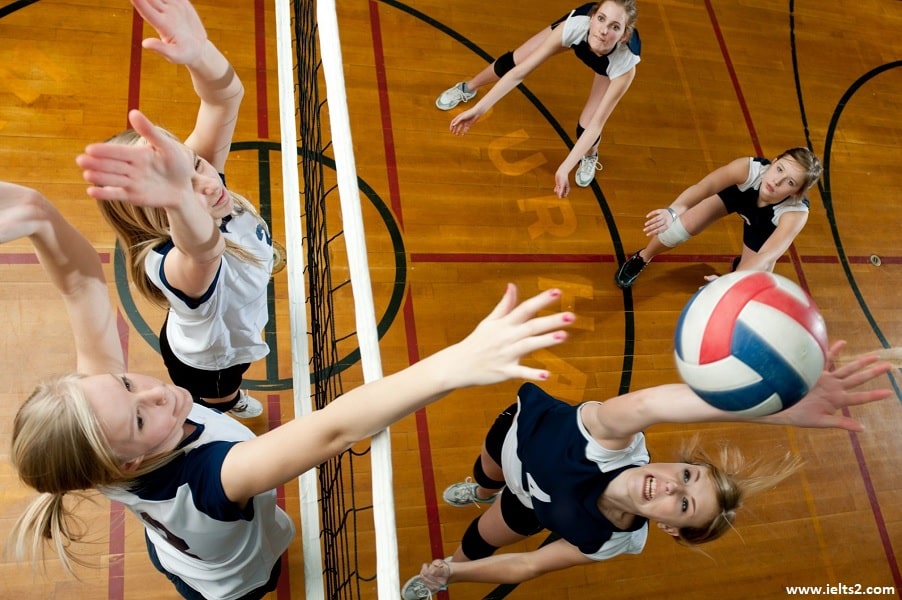نمونه سوالات اسپیکینگ تاپیک بازی های المپیک (نمره 9)
IELTS Speaking Questions with Band 9 Answers about Olympic Games
در این بخش بیش از 20 نمونه سوال اسپیکینگ آیلتس نمره 9 از آخرین سوالات گزارش شده از سنترهای ایرانی و خارجی برگزار کننده آیلتس مربوط به پارت 1، 2 و 3 با موضوع “بازی های المپیک” را برای شما فهرست کرده ایم. در ادامه همچنین نکات گرامری، لغات و دلایل دریافت نمره 9 را توضیح داده ایم. 1000 نمونه سوالات اسپیکینگ آیلتس با جواب PDF پارت 1 2 3 پیشنهاد بعدی ما به شما عزیزان است.
نمونه سوالات اسپیکینگ آیلتس موضوع بازی های المپیک (پارت 1)
در این بخش به سوالات اسپیکینگ آیلتس درباره تاپیک بازی های المپیک در اولین بخش آزمون آیلتس می پردازیم. در این بخش پاسخ ها می بایست کوتاه باشند. کوشش کنید پاسخ را در 10 تا 15 ثانیه تمام کنید و تمرین شما برای پاسخ های طولانی نباشد.
Questions and Model Answers (Band 9) for IELTS Speaking Part 1 – Topic: Olympic Games
1. Do you enjoy watching the Olympics?
Yes, I enjoy watching the Olympics because it showcases the pinnacle of human athletic achievement. It’s inspiring to see athletes from around the world compete with such dedication and skill. Additionally, the diverse range of sports and cultural representation makes it a truly global event. The sense of unity and sportsmanship it promotes is uplifting, reminding us of the power of teamwork and perseverance. I particularly enjoy events like gymnastics and swimming because they require incredible precision and physical endurance. Overall, the Olympics are a celebration of excellence and determination, which I find both entertaining and motivational.
2. What is your favorite Olympic sport?
My favorite Olympic sport is gymnastics because it combines strength, flexibility, and artistry in a way that’s mesmerizing. The level of discipline and training required to execute complex routines is truly remarkable. I’m especially fascinated by the floor exercise, where athletes perform with precision and creativity to music. Gymnastics is not just physically demanding but also mentally challenging, as competitors must maintain focus under immense pressure. Watching gymnasts perform inspires me to push my own limits and strive for excellence in my pursuits. It’s a sport that perfectly embodies the spirit of the Olympics.
3. Have you ever followed a specific Olympic athlete?
Yes, I’ve followed Usain Bolt, the legendary sprinter from Jamaica. His dominance in track and field, particularly in the 100m and 200m events, is unparalleled. Bolt’s charismatic personality and electrifying performances captivated audiences worldwide. His record-breaking achievements and unique celebration style made him a global icon. Beyond his athleticism, I admire his humility and ability to handle immense pressure. Watching him compete was thrilling, and he truly exemplifies what it means to be a champion. Bolt’s legacy inspires aspiring athletes to dream big and pursue greatness with determination and confidence.
4. Why do you think people are interested in the Olympics?
People are interested in the Olympics because it represents the pinnacle of athletic competition and brings together nations in a spirit of unity. The event highlights extraordinary talent and dedication, inspiring audiences to appreciate human potential. Additionally, the variety of sports caters to diverse interests, making it appealing to a wide audience. The stories of athletes overcoming adversity resonate with viewers, adding an emotional depth to the competition. The Olympics also provide a platform for cultural exchange, showcasing traditions from around the world. This combination of athleticism, inspiration, and diversity makes the Games universally appealing.
5. Do you think the Olympics promote unity among nations?
Yes, the Olympics play a significant role in promoting unity among nations. By bringing together athletes from over 200 countries, the Games create a platform for mutual respect and understanding. The spirit of fair play transcends political and cultural differences, fostering a sense of global togetherness. Events like the opening ceremony highlight cultural diversity while emphasizing shared values. Even moments of friendly competition can build bridges between nations. The Olympics remind us that, despite our differences, we are all part of a global community striving for excellence and harmony.
6. Are the Olympics important for young people?
Absolutely, the Olympics are important for young people as they inspire them to pursue sports and adopt a healthy lifestyle. Watching athletes demonstrate determination, discipline, and resilience can motivate youth to set ambitious goals. Additionally, the Games showcase diverse role models, encouraging inclusivity and breaking stereotypes. The values promoted by the Olympics—fairness, teamwork, and perseverance—are essential for personal and professional growth. Programs like the Youth Olympics further engage young people, helping them develop skills and confidence. Overall, the Olympics provide an invaluable source of inspiration for the next generation.
7. Have you ever watched the Olympics live on television?
Yes, I’ve watched the Olympics live on television several times, and it’s always an exhilarating experience. The live coverage captures the intensity and emotion of the competition, making you feel part of the action. I vividly remember watching the opening ceremonies, which are grand spectacles of culture and creativity. Events like swimming and track and field are particularly exciting, as they often feature dramatic finishes. Watching live also allows me to witness historic moments, like world records being broken. It’s a unique opportunity to celebrate human achievement in real-time.
8. Do you think hosting the Olympics is good for a country?
Hosting the Olympics can bring significant benefits to a country, such as economic growth, improved infrastructure, and global recognition. It boosts tourism and provides opportunities for local businesses. Additionally, investments in transportation and sports facilities leave a lasting legacy for residents. However, the financial costs and environmental impacts must be carefully managed to ensure long-term benefits. A well-planned Olympics, like London 2012, can enhance a country’s reputation and foster national pride. While challenges exist, the potential rewards often outweigh the risks if executed responsibly.
9. What is the most memorable Olympic moment you have seen?
The most memorable Olympic moment for me was Usain Bolt’s 100m final at the 2008 Beijing Olympics. His effortless performance and world-record time of 9.69 seconds were breathtaking. Bolt’s confidence and joy during the race made it unforgettable. He seemed to defy limits, showcasing the epitome of athletic excellence. That moment not only cemented his status as a legend but also inspired millions worldwide. It symbolized the power of hard work, talent, and self-belief. Watching it live was exhilarating, and it remains a defining memory of what the Olympics represent.
10. How do you think the Olympics have changed over time?
The Olympics have evolved significantly, becoming more inclusive and technologically advanced. Initially focused on traditional sports, modern Games now feature diverse events like skateboarding and surfing, appealing to younger audiences. The inclusion of the Paralympics and mixed-gender competitions reflects a growing emphasis on equality and representation. Technological advancements, such as instant replays and virtual audiences, have enhanced both the competition and viewing experience. Additionally, sustainability initiatives, like those at Tokyo 2020, highlight the Games’ commitment to addressing global challenges. These changes ensure the Olympics remain relevant and impactful in a rapidly changing world.
نمونه سوال اسپیکینگ آیلتس موضوع بازی های المپیک (پارت 2)
در اینجا یک نمونه دیگر از سوالات اسپیکینگ آیلتس درباره بازی های المپیک را برای پارت دوم داریم. در این بخش شرکت کننده در آزمون باید یک دقیقه خود را برای کارت زیر آماده کرده و 2 دقیقه درباره آن صحبت کند.
IELTS Speaking Part 2 Question – Topic: Olympics
Describe an Olympic event or athlete you admire.
You should say:
what the event or athlete is
when you first learned about them
why you admire them
and explain how they have inspired you or others.
Model Answer ( Band 9)
One Olympic athlete I deeply admire is Simone Biles, a gymnast who has achieved extraordinary success while breaking barriers in the world of sports. I first learned about her during the Rio 2016 Olympics, where she won four gold medals and one bronze, showcasing unparalleled skill, precision, and creativity. Her ability to perform challenging routines with remarkable consistency left a lasting impression on me.
What makes Simone truly remarkable, however, extends beyond her athletic achievements. She has been a vocal advocate for mental health, a topic often overlooked in competitive sports. During the Tokyo 2020 Olympics, she made headlines when she withdrew from several events, prioritizing her well-being over the pressure to compete. This decision sparked a global conversation about the importance of mental health, especially in high-pressure environments.
I admire Simone not only for her physical capabilities but also for her courage and authenticity. She has demonstrated that success is not solely defined by medals but also by the ability to stand up for one’s values and personal needs. Her advocacy has inspired countless individuals, including me, to prioritize self-care and resilience.
Simone’s journey reminds us that greatness is about balance—between ambition and self-preservation, strength and vulnerability. By embracing her humanity, she has redefined what it means to be a champion, proving that true inspiration comes from the way we handle challenges, not just from the victories we achieve.

نمونه سوالات اسپیکینگ آیلتس موضوع بازی های المپیک (پارت 3)
اما در آخرین بخش از مصاحبه آیلتس سوالات اسپیکینگ آیلتس پارت 3 درباره بازی های المپیک را میبینیم که محتوای دشوار تری نسبت به پارت های 1 و 2 دارند.
Questions and Model Answers (Band 9) for IELTS Speaking Part 3 – Topic: Olympics
1. Why do you think the Olympics are important for international relations?
The Olympics play a crucial role in fostering international relations by bringing nations together in the spirit of sportsmanship. They provide a platform for cultural exchange, where athletes and audiences alike gain exposure to diverse traditions and values. This fosters mutual understanding and reduces cultural stereotypes. Moreover, the Games promote diplomacy as leaders from different countries often attend, creating opportunities for dialogue. The emphasis on fairness and respect also sets a positive example for collaboration. For instance, joint teams, like North and South Korea in the past, demonstrate how sports can unify divided nations. Overall, the Olympics transcend politics and act as a reminder of our shared humanity.
2. Do you think hosting the Olympics benefits the host country?
Hosting the Olympics offers significant benefits, including economic growth, enhanced infrastructure, and global recognition. The influx of tourists boosts local businesses, while investments in transportation and stadiums leave a lasting legacy. Furthermore, the international exposure can elevate a country’s reputation, attracting future investment. However, these benefits come with challenges, such as high costs and potential environmental impact. For example, Rio 2016 faced criticism for underutilized venues. Despite this, successful planning and management, as seen in Tokyo 2020, can mitigate such issues and ensure the advantages outweigh the drawbacks.
3. How has the significance of the Olympics changed over time?
The Olympics have evolved from a purely athletic event to a global spectacle with economic, political, and cultural implications. Initially focused on showcasing athletic prowess, modern Games now include technological innovations like virtual audiences and augmented reality. The inclusion of more diverse sports and athletes highlights a shift toward greater inclusivity. Additionally, the event now serves as a platform for addressing global issues, such as sustainability and social justice. For example, Tokyo 2020 emphasized eco-friendly practices, demonstrating the Games’ growing role in influencing societal trends.
4. Should developing countries invest in hosting the Olympics?
Developing countries should weigh the potential benefits against the financial risks before deciding to host the Olympics. While it can stimulate economic growth and improve infrastructure, the high costs often burden the host nation, diverting funds from essential services like education and healthcare. Nevertheless, a well-executed plan, such as Brazil’s for Rio 2016, can provide opportunities for job creation and international exposure. However, smaller nations might find alternative investments more sustainable for long-term growth, as hosting the Olympics is not without challenges.
5. How do the Olympics promote diversity and inclusion?
The Olympics champion diversity by including athletes of varying genders, abilities, and ethnic backgrounds. The introduction of the Paralympics and events like mixed-gender relays exemplifies this commitment. Additionally, representation from over 200 countries fosters a sense of unity and equality. Such inclusivity inspires underrepresented groups worldwide, encouraging greater participation in sports. For instance, the Tokyo 2020 Games broke records for female athlete participation, showcasing progress toward gender equality. Ultimately, the Olympics embody the idea that sports can transcend barriers and celebrate human potential.
6. What are the environmental impacts of hosting the Olympics?
Hosting the Olympics often leads to significant environmental challenges, including deforestation, carbon emissions, and waste generation. However, recent efforts have sought to mitigate these impacts. Tokyo 2020, for instance, utilized renewable energy and recyclable materials for infrastructure. These initiatives demonstrate how sustainability can be integrated into large-scale events. Despite these efforts, the sheer scale of the Games often results in ecological strain. Therefore, adopting eco-friendly practices and prioritizing legacy projects are vital for minimizing long-term damage while still celebrating global unity.
7. What role does technology play in the modern Olympics?
Technology has revolutionized the Olympics, enhancing both athletic performance and audience experience. Innovations like wearables and advanced analytics help athletes optimize training, while AI ensures fairer adjudication by reducing human error. For spectators, technologies such as 4K broadcasting and virtual reality offer immersive viewing experiences. Furthermore, advancements in renewable energy and smart infrastructure reduce the event’s environmental footprint. In this way, technology not only modernizes the Games but also ensures their sustainability and inclusivity, reflecting the evolving demands of a global audience.
8. How do the Olympics influence younger generations?
The Olympics inspire younger generations by showcasing the values of perseverance, discipline, and fair play. Watching athletes overcome challenges motivates youth to pursue sports, promoting physical health and mental resilience. Additionally, the diverse representation of athletes fosters a sense of inclusion, encouraging participation regardless of background. Campaigns like “Olympism in Action” also engage young people in social issues, illustrating how sports can drive change. By instilling these values, the Olympics nurture a more active, empathetic, and globally minded generation.
9. Should politics have a role in the Olympics?
While the Olympics aim to remain apolitical, politics often influence various aspects, from hosting bids to athlete participation. For example, boycotts, such as the U.S. in 1980, highlight the intersection of politics and sports. While this can overshadow the Games’ spirit, it also provides a platform to address critical global issues like human rights. Striking a balance is essential—politics should not dominate but can serve as a catalyst for positive change. Ultimately, preserving the focus on unity and sportsmanship remains paramount.
10. What can be done to make the Olympics more sustainable?
To enhance sustainability, the Olympics should prioritize eco-friendly practices, such as renewable energy and biodegradable materials. Additionally, reusing existing venues and incorporating modular designs can minimize waste. Initiatives like carbon offset programs and public transportation also reduce the environmental footprint. Collaborating with environmental organizations ensures accountability, while public awareness campaigns encourage eco-conscious behavior. For instance, Paris 2024 plans to be the greenest Olympics yet, with 95% of venues repurposed and a focus on clean energy. Such measures set a benchmark for future events.
Explanation of Band 9 Factors
Grammar
- Complex Sentence Structures: Subordinate clauses, conditionals, and relative clauses enhance coherence (e.g., “While it can stimulate economic growth, the high costs often burden the host nation”).
- Wide Range of Tenses: Use of present, past, and future tenses effectively (e.g., “Tokyo 2020 emphasized eco-friendly practices”).
- Passive Voice: Skillful application for formal tone (e.g., “The inclusion of more diverse sports and athletes highlights a shift”).
Vocabulary
- Precise Word Choice: Use of topic-specific terms like “sustainability,” “inclusivity,” and “legacy projects.”
- Collocations: Strong phrases such as “global spectacle,” “lasting legacy,” and “mutual understanding.”
- Advanced Lexical Resources: Sophisticated expressions, including “foster mutual understanding” and “diverting funds from essential services.”
Fluency and Coherence
- Logical Flow: Ideas progress naturally with appropriate linking words like “Moreover,” “For instance,” and “Ultimately.”
- Fully Developed Ideas: Each answer addresses the question comprehensively with examples and explanations.
By combining advanced grammar, rich vocabulary, and coherent organization, these responses exemplify Band 9 proficiency.
تعیین سطح رایگان اسپیکینگ ❤️
نمونه سوالات اسپیکینگ آیلتس تاپیک بازی های المپیک پارت 1 2 3 را به همراه سمپل های نمره 9 آن ها با هم دیدیم. در ادامه نمونه سوالات دسته بندی شده اسپیکینگ آیلتس پیشنهاد آخر ما به دوستان گرامی هست. این نمونه سوالات اسپکینگ از پرتکرار ترین تاپیک های این بخش و همچنین جدیدترین موضوعات می باشند. این مجموعه توسط یکی از سایت های معتبر و فعال آیلتس تنظیم شده است. همچنین برای تعیین سطح و تعیین رایگان نمره اسپیکینگ و دریافت جدید ترین سمپل های نمره 9 در کانال تلگرام اسپیکینگ ما همراه باشید و به ادمین برای تعیین نمره اطلاع دهید.








